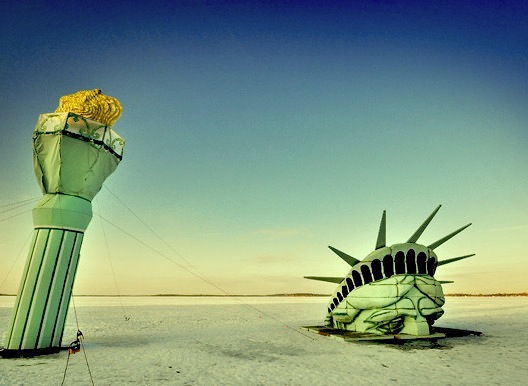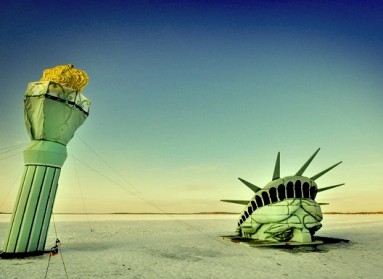A letter by Franz Kafka to Milena Jesenská. A sword in the arm of the Statue of Liberty is considered the only surrealist image in his novel Amerika. Any resemblance to real people is purely intentional.
[Prague, September 9, 1920]
Thursday
I am grateful you asked about my sleeping—it has steadily improved so that I slept through at least five consecutive hours one night this week, only awaking once when I heard that mouse squeak in the corridor again. Could it really be a mouse, or did I dream it up? I still haven't found him.
__________
Should I worry that I entertain you? It could scarcely be my actual intention. I would never dare try to entertain you on purpose. Your illuminated face, your accent rolling the r, and your telepathic humor make me give up on competing in the unannounced race for your attention then and there. I confess that my pride is sustained by imagining you gazing up to remember a phrase from these letters and being amused within yourself.
__________
You ask why, given the chance to be anything I am not now, I would choose to be an emigrant to America, and where that image of a little Eastern Jewish boy standing a few heads shorter than his confident father comes from. An emigrant to America, of all things, awaiting a ship with the family bundles all stacked in a neat row and hot cups of coffee being passed around. Milena, you know that America's mystery for me lies in its promise of earthly escape. Who could even pretend to find an exit door here? But it is there in the land of open pathways and immensely charted skies that the seduction of being what one was not in the beginning holds the most power. For Karl Roßmann it held the seduction of escape first, employment second, and security of other kinds following from that. Surely you understand. Max used to say, on the occasions I would let him discuss the book, that Karl R. was my younger brother, a 'lighter' (and younger) version of me (I remind him that Karl does not have a weak, nauseous stomach). I lack Karl's eagerness to please, which I remind Max (I can never tell how convincingly) is not a symptom of a weak will or lack of personal fortitude (or even pride?) but a hearty if naïve desire to express the truth of his good intentions. If there is something worse than not being believed, I do not know it. Karl's eager effort to put in solid labor (even in the uncertainty of his job prospects) is comprised of the work it takes to be believed. Because to be believed is to be understood. The half day-long railroad journey sharpens his eagerness even more. He is positively bursting to please. I sympathize entirely but keep young Karl's zealousness at a distance.
I wonder which American habit would aim to worsen my already ill health: the highway system or the carefully prepared smile.
__________
So you did not stop me from recounting the nightmares, and I harbor a suspicion that you are secretly very bored but simply too polite to stop me. Very well—now I will oblige you to protest out of sheer fatigue with me. Ever since 'The Stoker' was published (and translated by your very hand) I have only experienced two bad dreams about the widening Oklahoman landscape that faces Karl like an open mouth. The first, involving a bear and some pieces of loose string hanging from my coat, you already have memorized by heart. It is the second I never revealed because of its banality. Is anything less engrossing than other people's exhausted dreams at dawn, the ones that evaporate in a hurry before any semblance of a lasting memory about them is formed?
It begins when Karl, and here a version of me at sixteen stands in for him, when Karl feels himself called to the latrine on the train. The dull thump of the tracks reassures him that it is a good moment to cross the metal railing connecting the passenger load from the bathroom. You can imagine the repetitive strain of a machine giving a kind of kinetic assurance. But as Karl raises the latch on the passenger train the motor is flicked with some kind of boulder or large object. The entire train shakes. But it is too late because Karl is a footstep away from the latrine when the two iron bars attaching the cabins together stutter and burp (you have to imagine, Milena, that the American railway car in my nightmare has only two metal prongs holding it together, a design I have little interest or resource in verifying). Suddenly Karl's right foot gets sucked in between the two metal prods as the speeding ground beneath him swallows him up. He is suspended halfway inside the two halves of the train, his head still able to see and even talk to the onlooking bobble of passengers, but the train is unable to stop before its scheduled arrival. Karl's lower body dangles between the invisible bottom half of the metal prongs as his upper body attempts to calm down the other passengers, and even alerts them to the presence of an elderly lady about to faint in the back of the crowd. I should like to tell you that there was a resolution, even an act of heroism such as Dickens showed in the train crash in Kent. But in truth, the main worry in Karl's mind in the train's last gasps to its destination is, 'I hope no one has taken my passport from my seat, because I shall be totally lost without it.'

